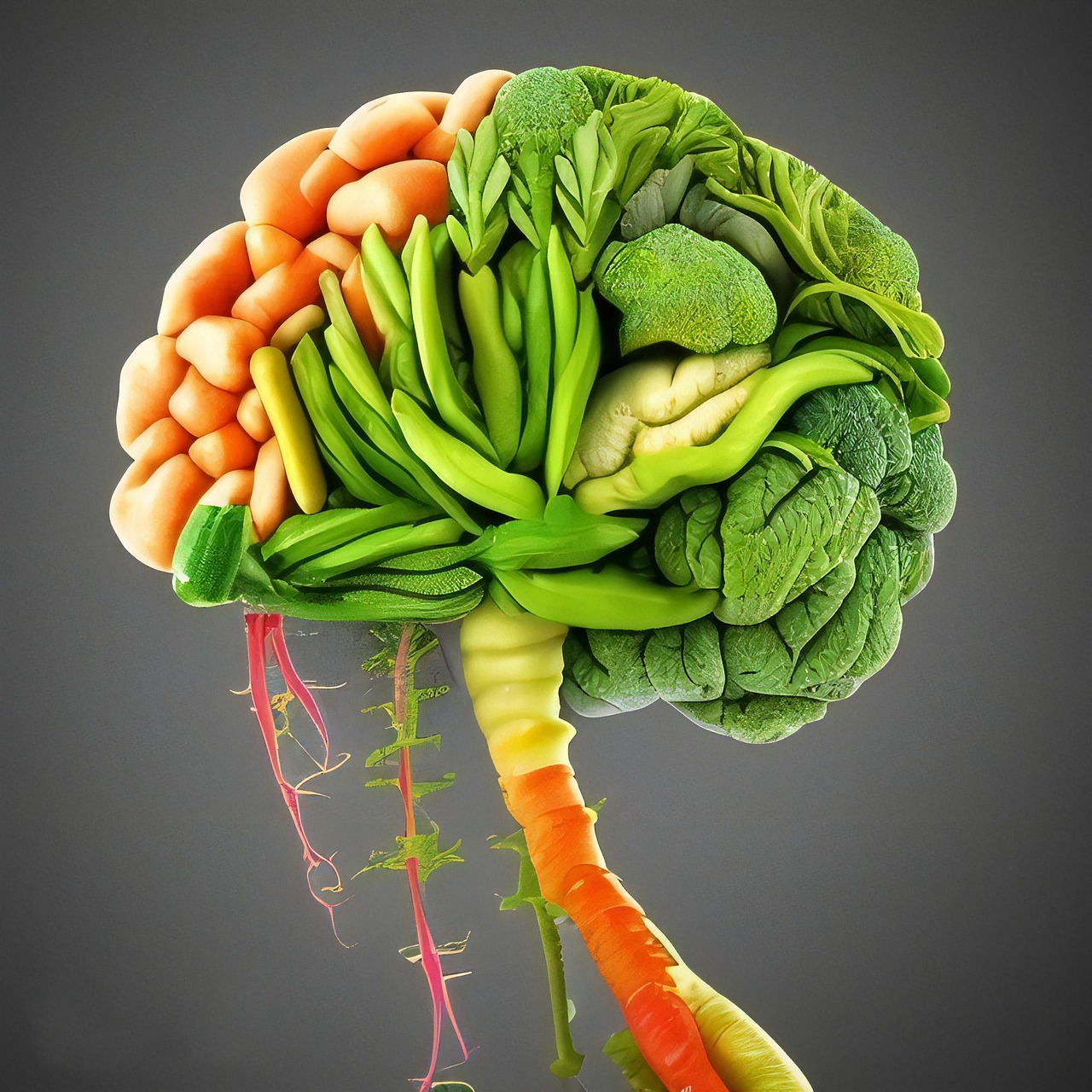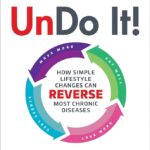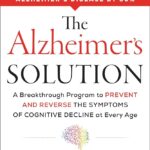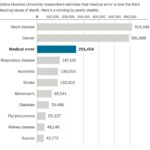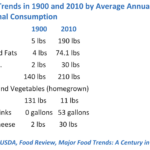Great news! Lifestyle medicine pioneer, Dr. Dean Ornish, and his team, have just published a study showing that an “intensive lifestyle intervention” that includes (1) a low fat, whole food plant-based diet, (2) moderate exercise, (3) stress management techniques, and (4) love & support groups, can slow, stop, or perhaps even reverse early dementia due to Alzheimer’s Disease (AD).
The study’s findings are more than encouraging, and will no doubt provide “new hope, and new choices” to millions of people. According to Dr. Ornish, “We do not yet have a cure for Alzheimer’s, but as the scientific community continues to pursue all avenues to identify potential treatments, we are now able to offer an improved quality of life to many people suffering from this terrible disease…I designed this intervention so you don’t have to have a lot of money to do it. This is for everyone.”
Background of the study (excerpt):
“Increasing evidence links lifestyle factors with the onset and progression of dementia, including AD. These include unhealthful diets, being sedentary, emotional stress, and social isolation. For example, a Lancet commission on dementia prevention, intervention, and care listed 12 potentially modifiable risk factors that together account for an estimated 40% of the global burden of dementia. Many of these factors (e.g., hypertension, smoking, depression, type 2 diabetes, obesity, physical inactivity, and social isolation) are also risk factors for coronary heart disease and other chronic illnesses because they share many of the same underlying biological mechanisms. These include chronic inflammation, oxidative stress, insulin resistance, telomere shortening, sympathetic nervous system hyperactivity, and others”.
Conclusions of Dr. Ornish’s Alzheimer’s study (excerpt):
“In summary, in persons with mild cognitive impairment or early dementia due to Alzheimer’s disease, comprehensive lifestyle changes may improve cognition and function in several standard measures after 20 weeks. In contrast, patients in the randomized control group showed overall worsening in all four measures of cognition and function during this time.”
Click here for the Alzheimer’s study.
Click here to learn more about the study from the American College of Lifestyle Medicine.
The Study’s Conclusions are Not Surprising
“Here’s the bottom line: the only diet that has been scientifically proven to reverse heart disease, to slow, stop, or reverse early-stage prostate cancer, and to reverse aging by lengthening telomeres (among other benefits) is a whole-foods plant-based diet low in both fat and refined carbohydrates.” – Dr. Dean Ornish, 2019
In his wonderful book, Undo It!, which he co-wrote with his wife Anne, Dr. Ornish explains that what is good for your heart, is good for your brain. In other words, most chronic diseases share a lot of the same “underlying biological mechanisms” (as mentioned above), and each one of these mechanisms is greatly influenced by what we eat, how much we exercise, how we deal with stress, and how much love and support we have in our lives.
Here are a few excerpts from Undo It! on the subject of inflammation, which show how inflammation can be greatly reduced or eliminated by (1) a plant-based diet, (2) exercise, (3) relaxation strategies, and (4) LOVE. 🙂
*Please note that “systemic inflammation” can cause oxidative damage to our cells, which contributes to heart disease; diabetes; obesity; cancer; and autoimmune, neurodegenerative, and inflammatory bowel diseases.
1. Plant-Based Diet: “A typical American diet is high in animal protein, which increases production of interleukins, blood chemicals that promote chronic inflammation. In contrast, plant-based proteins are low in inflammatory stimulants and contain literally thousands of protective substances such as phytochemicals, bioflavonoids, retinols, isoflavones, and others that actively decrease rather than increase chronic inflammation—providing a double benefit (protective rather than harmful). Reducing animal protein intake is known to reduce levels of a growth factor called IGF-1, which promotes chronic inflammation, and lower IGF-1 levels are linked to longer life span and reductions in the risk of cancer and diabetes…Most fruits and vegetables are anti-inflammatory, especially blueberries, strawberries, tomatoes, nuts, cruciferous vegetables such as broccoli, and green leafy vegetables. Animal protein dramatically increases the risk of premature death independent of fat and carbohydrates. In a study of over 6,000 people, those ages fifty to sixty-five who reported eating diets high in animal protein had a 75 percent increase in overall mortality, a 400 percent increase in cancer deaths, and a 500 percent increase in type 2 diabetes during the following eighteen years, whereas plant-based proteins reduced the risk of premature death in all of these categories—again, a double benefit…Naturally occurring sugars, when found in unprocessed fruits and vegetables, decrease inflammation. However, added sugar, high-fructose corn syrup, and refined carbohydrates such as white flour can cause chronic inflammation. In one study, for example, consuming just one can of soda per day led to an increase in inflammatory markers…Processing whole-wheat flour into white flour or brown rice into white rice removes the fiber and bran. This turns healthy carbohydrates into unhealthy ones that promote inflammation.”
2. Exercise: “A sedentary lifestyle increases inflammation, whereas exercise decreases it. Only twenty minutes of walking significantly reduces markers of inflammation.”
3. Stress Less: “Meditation also improved function of the vagus nerve, which connects the brain to the heart and other organs. The vagus nerve is part of the parasympathetic nervous system. As described in Chapter 2, our sympathetic nervous system is stimulated during stress, but our parasympathetic nervous system relaxes the body. It counterbalances the effects of stress-induced overstimulation of the sympathetic nervous system. Among other benefits, this reduces inflammation and enables better control of blood sugar…“What are you, a Hindu?” he replied, “No, I’m an Undo”. Peace comes not from doing, but from undoing; not from getting, but from letting go. It’s there already until you disturb it. The purpose of all spiritual practices is to stop disturbing what you already have.”
4. Love: “Love, social support, and intimacy. People who feel lonely, depressed, and isolated are three to ten times more likely to get sick and die prematurely from virtually all causes when compared to those who have strong feelings of love, connection and community.”
I lost my Mother, and a few aunts, to Alzheimer’s Disease (AD). Loving, and losing someone to Alzheimer’s, is an awful, and heartbreaking journey. Why is AD so deadly? According to UCLA Health, “AD is a progressive disease of the brain in which dementia is the most noticeable of numerous symptoms. Changes within the tissues of the brain slowly destroy vital connections between different regions of the brain, and between the brain and the body. The result is that Alzheimer’s disease is the fifth-leading cause of death among American adults over 65, and the sixth-leading cause of death for all adults nationwide.”
*Although more than 120,000 Americans die each year due to AD, its ranking among our top killers is actually a little lower, as the CDC and most health organizations ignore deaths due to medical errors & adverse drug reactions (likely because it’s bad for business), which according to a 2016 Johns Hopkins study, kills more than 251,000 Americans per year, and qualifies as the 3rd leading cause of death in the United States! My Mom, who loved to love, and was the hardest working person I have ever known, was on 8 prescription drugs at the time of her passing (I am convinced that the numerous medications also played a role in her rapid decline).
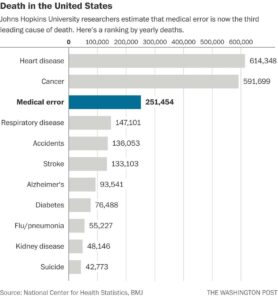
The Alzheimer’s Solution, by Drs. Dean and Ayesha Sherzai, is a Game-Changer
Another reason why I was not surprised by the findings from the Alzheimer’s study, is because I was lucky enough to read The Alzheimer’s Solution, a few years ago, which was nothing short of jaw-dropping. The authors, Drs. Dean and Ayesha Sherzai, are the Directors of the Alzheimer’s Prevention Program at Loma Linda University Medical, and big time champions of the power of plant-based nutrition. As a result, “Team Sherzai” has no doubt been improving and saving lives for years! I have tried to pull a few of the most essential takeaways/excerpts from The Alzheimer’s Solution, and share them below. What I like most about this husband and wife team is their humility, good nature, and ability to explain big ideas, and complicated processes, in simple ways that are evidence based.
I had known prior to reading their book, that the consumption of animal products and processed foods were destructive to our health (the studies & research that Team Sherzai provides regarding cognitive decline, adds further confirmation that this is clearly the case). I was still surprised to learn however, that sugar is at least as damaging as animal products, when it comes to brain health, and our risk for developing Alzheimer’s disease. My first sugar related wow moment is contained in the image at the bottom of the page, called the “NEURO Plan”, which shows that fruit juice, soda, sugary cereals, maple syrup and honey, as categorized by the Sherzai doctors, are at least as harmful to our brain, if not more so, than processed meats, butter, cow’s milk, eggs and bacon. My second wow moment, occurred when I read that the average American consumed only 5 pounds of sugar per year in 1900, and 190 pounds per year in 2010! This is in large part, due to the Standard American Diet (SAD), and the average American, for example, now consuming over 53 gallons of soda each year. It turns out that sugar is added to seemingly everything, and it can be really hard to exclude from our diet.
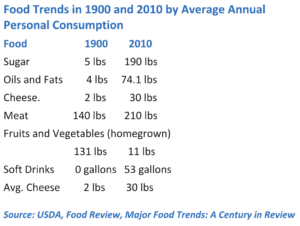
As per Drs. Dean & Ayesha Sherzai:
One out of every two Americans on a Standard American Diet (SAD), who are 85 years or older, will develop Alzheimer’s Disease or some form of dementia (statistically, 10% of the US population over the age of 65 already has dementia, as does 20-25% of people over the age of 75). While some chronic diseases are in decline, deaths due to Alzheimer’s have increased by nearly 87 percent in the last decade.
Interestingly, two out of every three people who are diagnosed with Alzheimer’s disease are women. Scientists are still trying to understand the biology of the disease in a woman’s brain, and how it differs from a man’s brain (there is speculation that menopause, hormones, longevity, and cultural factors such as a frequent lack of both career and educational opportunities are likely linked), yet one in six women develop Alzheimer’s after age sixty-five, while for men the chances are only one in eleven. Women in their sixties are also twice as likely to develop Alzheimer’s as they are to develop breast cancer.
The good news, according to “Team Sherzai”, is that a whole food, plant-based diet, along with a few other lifestyle factors/changes (such as regular exercise, sleep, love, and cognitive activity), can reduce your risk of developing Alzheimer’s by 90% (and if you, or someone you know is already burdened with some form of dementia, slow its progression). So, yes, 90%! This research is truly exciting as I knew very little about Alzheimer’s and incorrectly believed that to a large extent, we were all destined to suffer the fate of whatever inherited genetic predisposition we had. Fortunately, this is not the case. Although genetics still plays a part, it turns out that our diet, and other lifestyle factors, play an even bigger role (than genetics) when it comes to gene expression, and our risk of developing Alzheimer’s.
Did you know? (excerpts from The Alzheimer’s Solution, are in italics):
– Although the human brain is just a 3 pound organ, it consumes 25% of our body’s energy – which means that it is more vascular (relating to arteries and veins), and requires more blood, more energy, more oxygen, and basically more of everything.
– The Honolulu-Asian Aging study found that Japanese people living in the United States have a higher prevalence of Alzheimer’s than those living in Japan. Due to little genetic variance among the men in this study, the increased risk of Alzheimer’s can be attributed solely to the epigenetic influence of poor diet, lack of exercise and other unhealthy behaviors that are common in the United States.
– Epigenetic consequences (factors such as diet, sleep, lack of exercise & cognitive engagement, which can turn genes on and off over time), are appearing in India and China as people continue to move away from traditional lifestyles and adopt more modern ways of living. Diets high in vegetables and grains have been traded for animal products, refined sugar and saturated fats. People are also more likely to be sedentary. All of these unhealthy behaviors change our gene expression, and promote chronic disease. These dramatic-and unfortunate-lifestyle shifts give rise to the paradox of affluence: so called progress leading to more disease. China now has the world’s largest diabetes epidemic with 11.6 percent of adults developing this chronic condition, and many millions more with prediabetes. China is also ranked 2nd for obesity, behind only the United States. Both diabetes and obesity are major risk factors for dementia, which is also increasing exponentially. Alzheimer’s Disease International estimates that China had more than 6.4 million Alzheimer’s patients in 2009; another review in 2010 found that roughly 9.19 million Chinese are living with dementia. India is experiencing a dramatic rise in Alzheimer’s cases too.
– In the United States, children of immigrants from China and Japan suffer more from chronic disease than those who stayed in Asia.
Team Sherzai on the Components of a Healthy Lifestyle (NEURO Plan)
• Nutrition: Eating meat is bad for your brain. A whole-food, plant-based diet rich in vegetables, fruits, beans, whole grains, and healthy fats is what the brain requires to thrive (this diet should also be low in sugar, salt, and processed foods).
• Exercise: Physical exercise increases both the number of brain cells and the connections between them. An active lifestyle that incorporates movement every hour – not just a stop at the gym after an otherwise sedentary day.
• Unwind: Chronic stress puts the brain in a state of high inflammation, causing structural damage and impairing its ability to clear harmful waste products. Stress management in the form of meditation, yoga, mindful breathing exercises, time spent in nature, and the support of strong communities (love). Social support and meaningful, constant engagement with your community has an undeniable influence on the way your brain ages.
• Restore: Restorative sleep is essential for cognitive and overall health. Seven to eight hours of regular, detoxifying sleep through intensive sleep hygiene, treatment for sleep disorders, and management of medications and foods that adversely affect sleep.
• Optimize: Multimodal activities (like music) that challenge and engage many of the brain’s capacities, as well as meaningful social interaction. Higher education and other complex cognitive activities protect your brain against decline, even late in life.
Team Sherzai on Meat Consumption and the Brain
Here is the truth about diets high in meat: they unequivocally contribute to cognitive decline. A 1993 study at Loma Linda University called “The Incidence of Dementia and Intake of Animal Products,” the same study that first led us to investigate the Loma Linda population over a decade ago, found that in a group of over 3,000 subjects, those who ate meat—including those who ate only poultry and fish—had twice the risk of developing dementia compared to vegetarians. This same troubling association between meat and chronic disease has been found repeatedly for heart disease, cancer, and diabetes. Meanwhile, numerous epidemiological studies have shown that minimizing animal products has the opposite effect: people who consume a diet rich in leafy greens, vegetables, fruits, and nuts (with minimal red meat and dairy) are at the lowest risk for Alzheimer’s compared to people who consume fewer plants and more fatty animal products. In a new study published in 2017, researchers at Columbia University found that participants who ate a plant-based diet had a lower risk of cognitive decline over a span of six years compared to those who ate a standard American diet (SAD).
Drs. Dean & Ayesha Sherzai continue to inspire, and do exceptional work. The Alzheimer’s Solution is one of the best lifestyle medicine books on the planet. 🙂
And what can you say about the work of Dr. Dean Ornish, and his wife Anne? Their book, Undo It!, is a game-changer too for anyone interested in self-empowerment, and overall wellness. 🙂
So, once again we see that a Whole Food Plant-Based diet, is by far, the most powerful weapon we have to fight disease.
Even for Alzheimer’s.
Until next time…
Main Image: Pixabay
*Click here to learn more about brain health, and explore the courses offered by Team Sherzai.
*Click here to learn more from Dr. Ornish, and his 9 week program to prevent and possibly reverse the progression of heart disease (which may also significantly improve cognitive function in patients with early-stage Alzheimer’s disease).
Additional Published Studies:
Click here for a study that concluded that reducing meat consumption could significantly reduce the risk of Alzheimer’s disease, as well as several cancers, type 2 diabetes, stroke, and, likely, chronic kidney disease.
Click here for a study published in the journal of the American College of Nutrition, which analyzed dietary data from 10 countries, and showed that individuals who ate meat, including fish and poultry, had a 50% higher risk of developing dementia. Conversely, high intakes of fruits, vegetables, and whole grains significantly reduced the risk for Alzheimer’s disease.
Click here to learn more about the Power of a Vegan or Vegetarian diet.
Click here to learn more about the Adventist Mortality Study.
Click here to learn how the Women’s Health Study in Harvard University, found that people who ate a higher saturated fat diet had a faster decline in their memory by 70 percent. Additionally, Kaiser Permanente Northern California Group, studied 10,000 individuals, and found that those who ate a high cholesterol diet during their midlife had a 57 percent higher risk of developing Alzheimer’s.
Sources:
Click here to learn more about Dr. Ornish’s Alzheimer’s study from NutritionFacts.org.
Click here to learn more about the Alzheimer’s study from the American College of Lifestyle Medicine.
Click here for the Alzheimer’s study from Dr. Ornish and his team.
Click here to learn more from Ornish.com
Click here to learn more from the Preventive Medicine Research Institute (PMRI).
Click here to learn more about the leading causes of death from Dr. Michael Greger.
Click here to learn more about medical errors being the 3rd leading cause of death of Americans.
Click here to learn more from UCLA Health.
Click here to learn more from the Blue Zones.
Click here to learn more about oxidative stress.
Click here to learn more about chronic inflammation.
Click here to learn more about insulin resistance.
Click here to learn more about telomere shortening.
Click here to learn more about the sympathetic nervous system.
Click here for Drs. Dean & Ayesha Sherzai’s website.
Click here to learn more about The Alzheimer’s Solution.
Click here to learn more about the Lancet study on dementia.
Click here to learn more about Alzheimer’s Disease from Dr. T. Colin Campbell.
Click here to learn more about systemic inflammation.
Click here to learn more about the Standard American Diet (SAD).
Click here to learn more about the prevention of Alzheimer’s from Team Sherzai.
Click here to learn more about obesity in America.
Click here to learn more about obesity in China.

